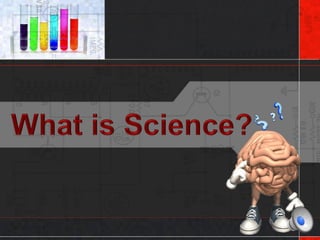The Nature of Science
•Télécharger en tant que PPT, PDF•
2 j'aime•437 vues
First set of notes on the Nature of Science (the Scientific Method).
Signaler
Partager
Signaler
Partager

Recommandé
Recommandé
Contenu connexe
Tendances
Tendances (20)
Historical perspective of science by: Karl popper and thomas kuhn 

Historical perspective of science by: Karl popper and thomas kuhn
En vedette
En vedette (7)
Similaire à The Nature of Science
Similaire à The Nature of Science (20)
Dernier
https://app.box.com/s/7hlvjxjalkrik7fb082xx3jk7xd7liz3TỔNG ÔN TẬP THI VÀO LỚP 10 MÔN TIẾNG ANH NĂM HỌC 2023 - 2024 CÓ ĐÁP ÁN (NGỮ Â...

TỔNG ÔN TẬP THI VÀO LỚP 10 MÔN TIẾNG ANH NĂM HỌC 2023 - 2024 CÓ ĐÁP ÁN (NGỮ Â...Nguyen Thanh Tu Collection
Mehran University Newsletter is a Quarterly Publication from Public Relations OfficeMehran University Newsletter Vol-X, Issue-I, 2024

Mehran University Newsletter Vol-X, Issue-I, 2024Mehran University of Engineering & Technology, Jamshoro
Dernier (20)
TỔNG ÔN TẬP THI VÀO LỚP 10 MÔN TIẾNG ANH NĂM HỌC 2023 - 2024 CÓ ĐÁP ÁN (NGỮ Â...

TỔNG ÔN TẬP THI VÀO LỚP 10 MÔN TIẾNG ANH NĂM HỌC 2023 - 2024 CÓ ĐÁP ÁN (NGỮ Â...
Food safety_Challenges food safety laboratories_.pdf

Food safety_Challenges food safety laboratories_.pdf
Russian Escort Service in Delhi 11k Hotel Foreigner Russian Call Girls in Delhi

Russian Escort Service in Delhi 11k Hotel Foreigner Russian Call Girls in Delhi
This PowerPoint helps students to consider the concept of infinity.

This PowerPoint helps students to consider the concept of infinity.
Python Notes for mca i year students osmania university.docx

Python Notes for mca i year students osmania university.docx
UGC NET Paper 1 Mathematical Reasoning & Aptitude.pdf

UGC NET Paper 1 Mathematical Reasoning & Aptitude.pdf
Asian American Pacific Islander Month DDSD 2024.pptx

Asian American Pacific Islander Month DDSD 2024.pptx
Micro-Scholarship, What it is, How can it help me.pdf

Micro-Scholarship, What it is, How can it help me.pdf
On National Teacher Day, meet the 2024-25 Kenan Fellows

On National Teacher Day, meet the 2024-25 Kenan Fellows
Basic Civil Engineering first year Notes- Chapter 4 Building.pptx

Basic Civil Engineering first year Notes- Chapter 4 Building.pptx
Seal of Good Local Governance (SGLG) 2024Final.pptx

Seal of Good Local Governance (SGLG) 2024Final.pptx
The Nature of Science
- 2. What is Science? Science is a process that uses observations and investigations to gain knowledge about nature.
- 3. • Must be capable of being disproved. • Must incorporate existing knowledge. • Must be able to absorb new findings. • Must be capable of predicting outcomes. • Must be stated in clear, unambiguous language. • Must be part of an ongoing process to gain knowledge and understanding. Requirements for Science
- 4. • Cannot answer questions about the supernatural. • Cannot answer questions about morality. • Is not democratic. Limits of Science
- 5. What is the Scientific Method? - an organized set of investigational procedures -usually presented as steps to be followed
- 6. 1. State the Problem • Why? • How? • Should be stated in a clear and concise manner
- 7. 2.Gather Information & Make Observations Learn about the background of the problem from: –Your own research –Research from other scientists
- 8. 2.Gather Information & Make Observations 2 types of observations: Qualitative: describe characteristics, but do NOT involve numbers (He is tall.) Quantitative: involve measurements and numbers (He is 6’11”).
- 9. 3.Form a Hypothesis • A hypothesis is NOT a guess. • A prediction of what you think will happen under certain conditions based on what you know from observations or research. • State your prediction in measurable terms so that it can be tested.
- 10. 10 4. Test the Hypothesis • An experiment is a set of steps you follow to test a hypothesis • The procedure or steps of your experiment should be very detailed.
- 11. 5. List and Analyze the Results
- 12. 6. Draw a Conclusion • Looking at the results and comparing them with the problem • Was your hypothesis correct? • WHY or WHY NOT? Explain!!! • A clear and concise answer to the orginal question.
- 13. 7. Report Results • The results and conclusions are communicated to the public or published in a scientific journal. • This is important both to disseminate knowledge and to allow other scientists to test, replicate, and question the results.
- 14. Repeatability • If the experiment is well-designed, then the outcome should be the same whenever the experiment is replicated. • Repeatability, getting the same results every time, is an important requirement of science and a major difference between science and other ways of gaining knowledge.
- 15. Review: Scientific Method 1.State the Problem 2.Gather Information and make Observations 3.Form a Hypothesis 4. Test the hypothesis. 5. List and Analyze the Results 6. Draw a Conclusion 7. Report Results
- 16. An Important Note! • The steps presented are VERY simplified in order to introduce the main features of scientific thinking. • In reality, scientists engage in many different activities in many different sequences. Investigations often involve repeating the same steps many times to account for new information and ideas.
- 17. In Other Words… the process of science is exciting, dynamic, and unpredictable. Science relies on creative people thinking outside the box!
Notes de l'éditeur
- Experiment; steps
